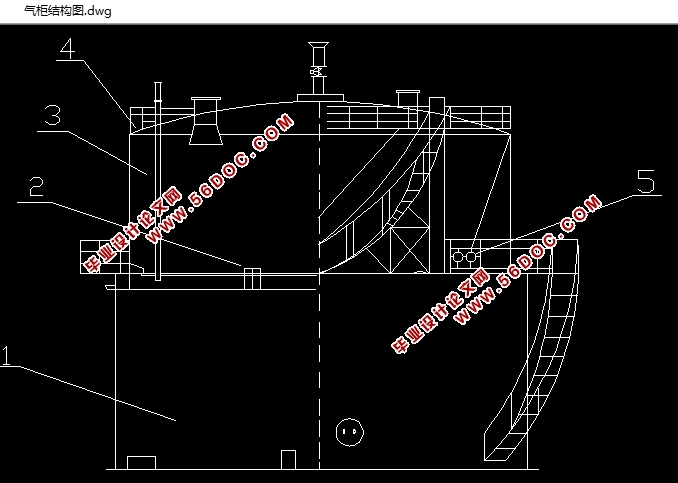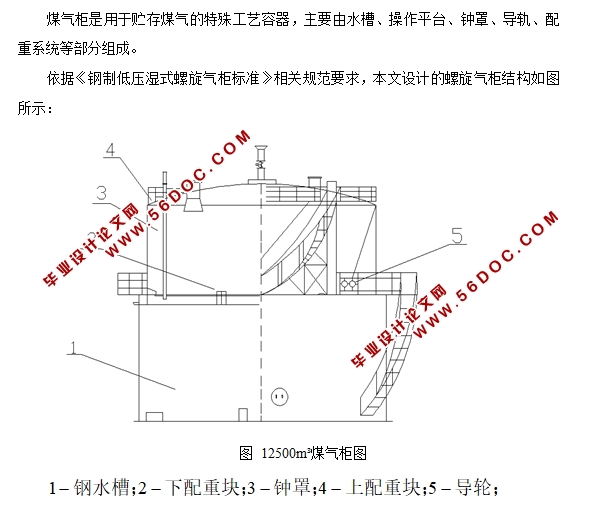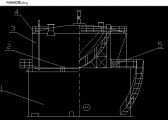煤气柜安全设计与风险分析(含CAD图)(论文16000字,CAD图1张)
摘要
煤气多数都属于可燃、易爆、有毒气体。轻微的煤气泄漏可使人中毒,神志不清而重度的煤气重度则可使人窒息甚至有生命危险。煤气在于空气混合后在遇到电火花,明火等激发能源时更是会发生火灾,燃烧爆炸等事故。随着近年来工业的飞速发展,煤气的运用愈发广泛,相应地,对于煤气贮存的要求亦越来越高。因此对煤气柜进行合理规范的安全设计并进行安全评价对于减少煤气柜事故的发生,提高社会安全指数、减少人员伤亡具有十分重要的现实意义。在根据我国相关规范以及查阅参考相关权威期刊、论文的基础上开展2500m³湿式螺旋煤气柜的设计及安全评价。包括水槽壁板壁厚,钟罩壁板壁厚,气柜配重的计算设计,安全附件的选择等。运用了事故树分析法、故障模式与影响分析法、道化学法等相关安全评价分析方法对设计煤气柜进行安全分析与评价,确定煤气柜危险程度及危险因素并提出系统的事故防范初步安全措施。最后进行回顾总结和展望。
关键词:湿式气柜 安全设计 安全评价
Safety Design and Risk Analysis of Gas Tank
Abstract
Gas mostly belongs to combustible, explosive, poisonous gas. A slight gas leak can poison a person, while a severe gas leak can suffocate or even kill a person. Gas is mixed in the air after the encounter spark, open fire and other energy excitation will be more fire, combustion explosion and other accidents. With the rapid development of industry in recent years, the application of gas is more and more extensive, correspondingly, the demand for gas storage is also higher and higher. Therefore, reasonable and standard safety design and safety evaluation of gas tank is of great practical significance to reduce the occurrence of gas tank accidents, improve social safety index and reduce casualties. The design and safety evaluation of the 2500m wet spiral gas tank were carried out on the basis of relevant codes in China and reference to related authoritative journals and papers. It includes the wall thickness of sink wall, the wall thickness of bell jar wall, the calculation and design of gas tank counterweight, and the selection of safety accessories. The safety evaluation and analysis methods such as accident tree analysis method, failure mode and influence analysis method and trace chemical method were used to analyze and evaluate the safety of the designed gas tank, determine the degree of risk and risk factors of the gas tank, and put forward the preliminary safety measures for the systematic prevention of accidents. Finally, review and prospect are made.
Key words:Wet Gas Tank ;Safety Design; Safety Evaluation



目录
摘要 I
Abstract II
第一章 概述 1
1.1背景介绍 1
1.2国内外研究现状 1
1.3研究内容及意义 2
第二章 煤气柜的设计 4
2.1煤气柜的型号及材料选择 4
2.1.1煤气柜的选择 4
2.1.2煤气柜的选材 4
2.2煤气柜的组成 5
2.2.2钟罩 5
2.2.3中节 6
2.2.4轨道、导轮 6
2.2.5操作平台及楼梯间 6
2.3小结 6
第三章 煤气柜的计算 7
3.1水槽壁板厚度的计算 7
3.2水槽底板厚度的确定 8
3.3钟罩壁板厚度的计算 8
3.4配重的计算 8
3.5安全附件 10
3.5.1安全栅 10
3.5.2避雷设计 10
3.5.3压力表 10
3.5.4安全罩帽 11
第四章 气柜的风险分析 12
4.1煤气柜的危险有害因素辨识 12
4.1.1火灾爆炸 13
4.1.2高空坠落 13
4.1.3中毒窒息 13
4.1.4雷击现象 13
4.2事故数分析法(FTA) 13
4.2.1煤气柜的事故树分析 14
4.2.2气柜事故树的定量分析 14
4.3煤气柜的HAZOP风险分析 16
4.3.1 HAZOP分析方法简介 16
4.3.2 HAZOP的应用程序 16
4.3.3煤气柜的HAZOP分析 17
4.4 煤气柜的FMEA风险分析 18
4.4.1FMEA风险分析方法简介 18
4.4.2FMEA分析的程序 18
4.4.3煤气柜的FMEA分析 19
4.5基于道化学评价法的事故后果分析 22
4.5.1基本参数及评价步骤 23
4.5.2评价内容 23
4.6小结 28
第五章 煤气柜的安全运行及管理措施 30
5.1提高气柜安全运行技术的运用 30
5.1.1气柜柜容联运报警 30
5.1.2缝隙测量系统 30
5.1.3工艺连锁功能系统 31
5.2 煤气柜安全管理措施 31
5.2.1完善制度管理 31
5.2.2优化设备管理 32
5.2.3加强检查管理 32
5.2.4强化检修管理 32
5.2.5加强员工安全培训,完善危险应急管理机制 32
总结与展望 34
参考文献 35
|







